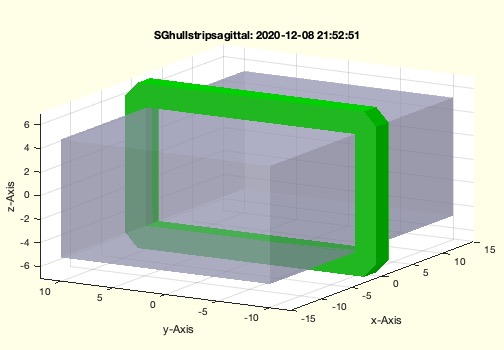SGhullstripsagittal
by Tim C. Lueth, SG-Lib Toolbox: SolidGeometry 5.6 - Modeling function
Introduced first in SolidGeometry 5.0, Creation date: 2020-12-08, Last change: 2025-09-15
returns a string around the sagital plane
See Also: CPLofSGhull
, CPLfft
Example Illustration

Syntax
X=SGhullstripsagittal(A,[x,b,w])
Input Parameter
A: | | Solid |
x: | | x coordinate of the strip center |
b: | | width of the strip |
w: | | wall thickness of strip |
Output Parameter
X: | | Solid Geometry of the Strip |
Examples
SGhullstripsagittal(SGbox,0,5,1)
Copyright 2020-2025 Tim C. Lueth. All rights reserved. The code is the property of Tim C. Lueth and may not be redistributed or modified without explicit written permission. This software may be used free of charge for academic research and teaching purposes only. Commercial use, redistribution, modification, or reverse engineering is strictly prohibited. Access to source code is restricted and granted only under specific agreements. For licensing inquiries or commercial use, please contact: Tim C. Lueth
Algorithm (Workflow)
This algorithm is designed to create a solid geometry strip around the sagittal plane of a given solid. The function is named SGhullstripsagittal and is part of the SolidGeometry library. Below is a detailed explanation of the algorithm and its parameters.
Input Parameters
- A: The solid object around which the strip is to be created.
- x: The x-coordinate of the strip's center. This is an optional parameter with a default value of 0.
- b: The width of the strip. This is an optional parameter with a default value of 2.
- w: The wall thickness of the strip. This is an optional parameter with a default value of 2.
Output
- X: The solid geometry of the strip created around the sagittal plane.
Algorithm Steps
- Retrieve the parameters
x, b, and w using the getfuncparams function. Default values are used if parameters are not provided.
- Create a bounding box
B around the solid A with dimensions [10 10 10].
- Set the width of the bounding box
B to b.
- Transform
B to align with A using the SGtransrelSG function, centering it at the x-coordinate x.
- Intersect the solid
A with the transformed bounding box B to create a new solid C.
- Extract the contour polygon list (CPL) from the solid
C using the CPLofSGhull function.
- Remove straight lines from the CPL using the
CPLremstraightAmin function.
- Create a new solid
X from the CPL, adding a buffer with thickness w.
- Rotate the solid
X by 90 degrees around the yx-plane using the SGrotate function.
- Align the transformed solid
X with the original solid C using the SGtransrelSG function.
- If no output is requested, plot the original solid
A and the resulting strip X using the SGplotalpha function.
Algorithm explaination created using ChatGPT on 2025-08-19 01:27. (Please note: No guarantee for the correctness of this explanation)
Last html export of this page out of FM database by TL: 2025-09-21